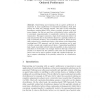Free Online Productivity Tools
i2Speak
i2Symbol
i2OCR
iTex2Img
iWeb2Print
iWeb2Shot
i2Type
iPdf2Split
iPdf2Merge
i2Bopomofo
i2Arabic
i2Style
i2Image
i2PDF
iLatex2Rtf
Sci2ools
138
click to vote
HEURISTICS
2006
2006
A logic of soft constraints based on partially ordered preferences
Representing and reasoning with an agent's preferences is important in many applications of constraints formalisms. Such preferences are often only partially ordered. One class of soft constraints formalisms, semiring-based CSPs, allows a partially ordered set of preference degrees, but this set must form a distributive lattice; whilst this is convenient computationally, it considerably restricts the representational power. This paper constructs a logic of soft constraints where it is only assumed that the set of preference degrees is a partially ordered set, with a maximum element 1 and a minimum element 0. When the partially ordered set is a distributive lattice, this reduces to the idempotent semiring-based CSP approach, and the lattice operations can be used to define a sound and complete proof theory. A generalised possibilistic logic, based on partially ordered values of possibility, is also constructed, and shown to be formally very strongly related to the logic of soft con...
Related Content
| Added | 12 Dec 2010 |
| Updated | 12 Dec 2010 |
| Type | Journal |
| Year | 2006 |
| Where | HEURISTICS |
| Authors | Nic Wilson |
Comments (0)

